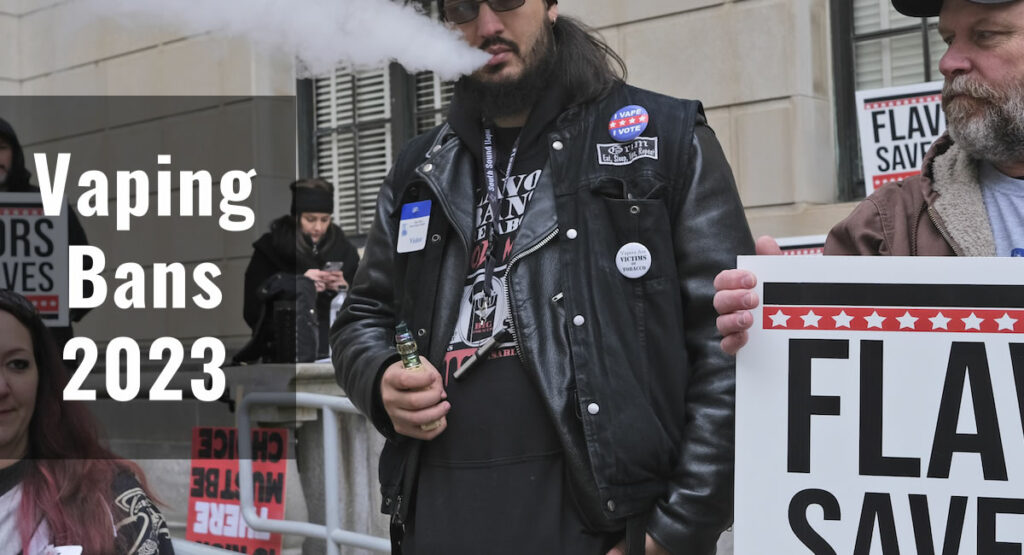Government stances on vaping products vary widely worldwide, ranging from encouragement to outright prohibition. This article examines the patchwork of vape bans imposed at the national, state, and local levels in the U.S. and internationally.
U.S. State and Local Bans on Vape Flavors and Online Sales
While federal agencies like the FDA regulate vaping, most bans in the U.S. occur at the state and city levels. These restrictions typically target flavors and online sales rather than total prohibition.
California
California prohibits the in-store sale of vape products in flavors other than tobacco, following voter approval of Proposition 31 in November 2022. However, online sales remain legal temporarily. Some localities like Los Angeles and San Francisco have stricter bans.
Massachusetts
In 2019, Massachusetts became the first state to ban retail sales of all flavored vaping products, including menthol. Only tobacco flavors are permitted.
New Jersey
New Jersey bans flavors except for tobacco in vape products. A proposed nicotine limit was vetoed by the governor.
New York
New York bans retail sales of flavored vapes except tobacco and menthol. An online sales ban also exists for all vaping products.
Rhode Island
Rhode Island’s health department banned all flavored vape products except tobacco in 2020 via executive order.
Arkansas, Georgia, Hawaii, Maine, Oregon, South Dakota, Utah, Vermont
These states prohibit all online sales of vaping products, with exceptions for transactions between licensed wholesalers/retailers.
Notable local bans on flavors and/or sales include Chicago, Los Angeles, San Diego, and Boulder. Overall, the toughest U.S. restrictions remain localized rather than federal or statewide.
Source:
International Vape Bans – Countries Prohibiting E-Cigarette Sales or Use
Over 40 countries globally impose some form of prohibition on vaping products, whether on sales, possession, or both. The bans are concentrated in Asia, the Middle East, and South America.
Australia
Nicotine vaping products are prescription-only in Australia. Private importation is illegal and punishable by massive fines.
Brazil
Vape sales are banned in Brazil, but personal use is still permitted. A black market persists.
Canada
Canada recently enacted nicotine limits and extreme flavor restrictions nationwide, just a few years after initially taking a liberal stance similar to the UK.
Hong Kong
Hong Kong banned sales of vaping products in 2022. However, possession remains legal for now.
India
India banned vape sales in 2019 while continuing to permit cigarette sales, citing tobacco control. Grey market imports satisfy vaper demand.
Japan
Nicotine vapes are banned in Japan, but heated tobacco products are legal. Devices and zero-nicotine e-liquids are permitted.
Malaysia
Malaysia allows vape usage but prohibits nicotine-containing vape sales. Retailers are subject to unpredictable raids.
Mexico
Mexico banned sales of all vaping products in 2022, prompting lawsuits from vendors disputing the blanket prohibition.
Singapore
Singapore instituted a complete ban on e-cigarette possession and use in 2018. However, smuggling networks persist due to demand.
South Korea
South Korea is considering a ban on flavored e-cigarettes in 2023 following the FDA’s lead in the United States.
Thailand
Thailand strictly enforces prohibitions on vape sales and importation, detaining and deporting tourists violating the laws.
Turkey
While importation is banned in Turkey, contradictory regulations create grey areas allowing use and domestic sales.
United Arab Emirates
The UAE prohibits all vape sales and possession, with both fines and possible jail time for violators. However, a sizable black market exists.
Other nations banning vape sales and use include Cambodia, Indonesia, Jordan, Kuwait, Laos, Nepal, Oman, Qatar, Saudi Arabia, Taiwan, and Vietnam. The availability of smuggled contraband varies.
In other countries like Colombia, Egypt, and Lebanon, personal vape use is permitted but sales remain prohibited. Some nations allow sales but block imports or nicotine-containing vapes specifically. Enforcement approaches differ as well.
Weighing the Pros and Cons of Vape Prohibition
Arguments around vape bans essentially distill down to perceived pros like health protection versus cons like stifled harm reduction potential.
Pros of vape bans:
-
- Prevent youth access and teen vaping appeal
- Eliminate health risks if safety concerns are valid
- Simplify regulatory landscape for agencies
- Align with cultural norms and traditions in some Asian and Middle Eastern countries
Cons of vape bans:
-
- Foster black market with no safety standards
- Deny cigarette smokers access to reduced-harm alternatives
- Destroy jobs and economic activity in the vaping sector
- Infringe on consumer choice and freedom
The appropriate policy balance continues being debated. While the vaping landscape evolves worldwide, advocates must weigh benefits and repercussions of various regulatory models.
- Spain to Ban Vaping in All Smoke-Free Public Spaces - June 26, 2025
- Illinois Triples Vape Tax to 45%, Cigarette Tax Also Rises - June 26, 2025
- Indonesian Vape Group Criticizes Jakarta’s Draft Vaping Law - June 23, 2025


